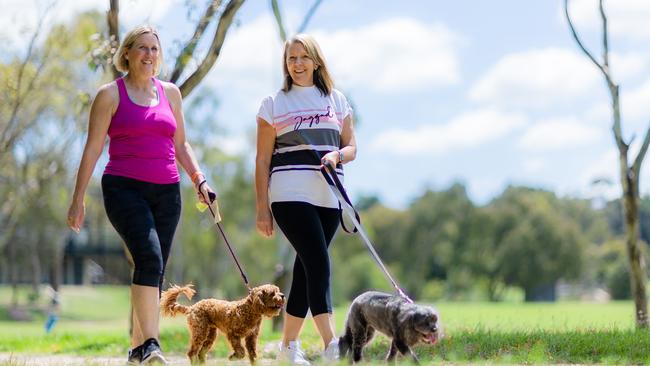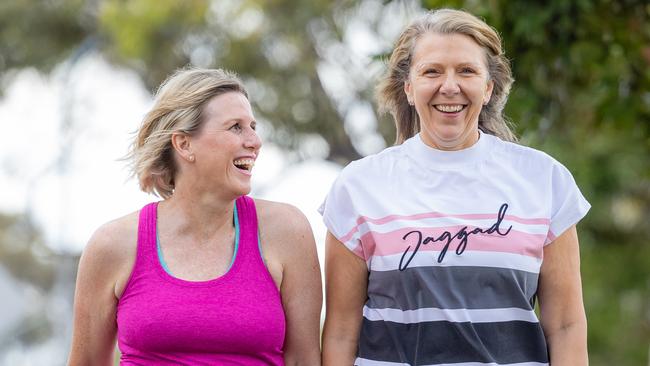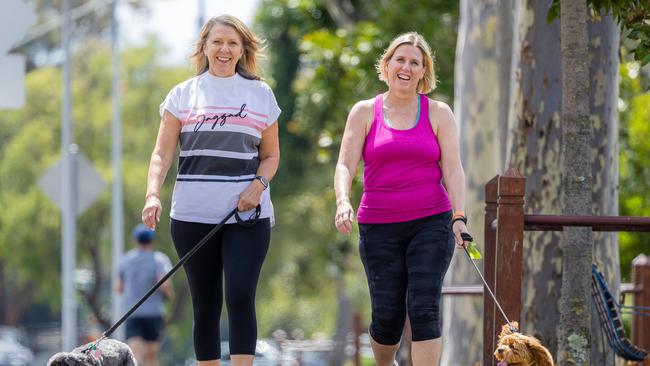Health of the Nation: Shocking stats reveal how many Aussies over 50 are overweight and unhealthy
For men and women hitting the age of 50, there’s a very-real midlife battle as many begin to struggle with their health. Luckily, there are ways to deal with the changes.

Adults 50-70
Don't miss out on the headlines from Adults 50-70. Followed categories will be added to My News.
The hormonal disruption that strikes in your 50s is seismic.
For women, it means menopause and the tiredness, muscle and bone loss that comes with it. For men, it means mood swings and the loss of muscle mass and sexual function.
And for both sexes, there’s the very-real, midlife battle of the bulge.
But medical and scientific developments have made hitting half a century a lot more tolerable — and an opportunity to lay the groundwork for a longer life.

This can be as simple as undergoing cancer and other health checks to ensure early detection and treatment.
Eating more protein, getting moving to prevent muscle and bone loss and improving your gut bacteria is critical in your 50s.
So is the time you exercise and eat — and which order you eat your food in can make a difference.
New research also suggests increasing the amount of an amino acid called Taurine might slow down the ageing process.
TAKE OUR HEALTH CALCULATOR
LOSING 5KGs A ‘CONSTANT BATTLE’
For close friends Cathy Lewis and Sally Luscombe, regular walks are essential as they battle to shift unwanted kilos gained during the menopause.
Both women say it’s been one of the toughest challenges of getting older.
“It’s hard to accept that the weight seems to go on without you actually doing anything differently,” Ms Lewis said.
Ms Luscombe, who walks regularly along Melbourne’s scenic Maribyrnong River and attends pilates classes, said losing the “elusive five kilos” was a “constant battle” and that women in their 50s often struggled with self-image as they went through the change of life.

“My girlfriends and I were laughing about it saying you would have to live on air to lose weight,” she said. “The minute you put a treat to your lips, the weight goes back on.”
Thankfully, there is a solution to hormonal weight gain during the menopause and it boils down to protein.
Health experts suggest women ensure their meals contain 20-30g of protein to help counteract muscle loss. Greek-style yoghurt, salmon fillets and beans on wholegrain toast are examples of good protein sources, said nutritionist Faye James, author of The Menopause Diet.
She said women should ditch refined carbs such as white pasta and bread to eliminate excess belly fat, and limit alcohol.
SHOCKING HEALTH STATS FOR OVER 50S
A staggering eight in 10 men (78.1 per cent) and seven in 10 women (69.3 per cent) are overweight or obese by their mid-50s.
Three quarters of people in this age group have a waist circumference that puts them at risk of metabolic complications, including heart disease, stroke and type 2 diabetes.
Yet only 16 per cent per cent are doing something about it, adhering to the exercise guidelines of at least 30 minutes of physical activity on most, preferably all, days.
By their mid fifties more than nine in ten (98.6 per cent) of people will have a long-term health condition, such as heart disease, cancer, diabetes, lung, kidney disease or arthritis.

WHAT’S NEW ABOUT MENOPAUSE?
Medical guidelines have dramatically changed advice about how to manage menopause, which starts around the age of 50 and causes symptoms like hot flushes, difficulty sleeping, anxiety and mood changes for 5-10 years.
New analysis has found that using the once-shunned Hormone Replacement Therapy (HRT) in early menopause can not only manage hot flushes and other symptoms but protect the heart and reduce death from all causes.
Last year the Australian Menopause Society recommended doctors consider prescribing it solely to protect women aged under 65 from thinning bones.
Researchers have also discovered that menopausal changes mean women start to lose the protein needed in their diet — and the deficit causes them to crave savoury junk foods
“There’s a risk of exceeding your calorie requirements, you’re going to be at risk of eating calories that are fats and carbs because they’re within foods that taste like protein, but they’re not. These are what we call protein decoys,” University of Sydney Professor Steve Simpson said.
Women should bump up their protein by around three per cent a day and cut out sugary drinks or potato chips, which will help control weight gain.
“That (extra protein) would be adding the equivalent of an extra egg a day, in terms of nuts 37 grams would do the same thing,” Prof Simpson said.
When protein requirements aren’t being met women are at risk of brittle bones and muscle wastage.

IMPORTANCE OF DIET
Like other age groups, the Mediterranean diet is recommended, however research has shown there may be some benefits to modifying it in your 50s.
The DASH diet emphasises eating olive oil, fruit and vegetables and whole grains, like its European equivalent, but limits salt to between 1500mg and 2300 mg per day to reduce blood pressure problems. It also advocates eating low fat dairy to reduce cholesterol.
The MIND diet alternative encourages certain foods such as strawberries, blueberries, raspberries, and blackberries that have a positive effect on the brain.
Researchers have found people who most closely adhered to this way of eating had a 53 per cent lower rate of Alzheimer’s disease, a lower risk of dementia, and slower cognitive decline.
New research also suggests older Australians should consider increasing the amount of an amino acid called taurine in their diet, with evidence it can increase the lifespan of mice and monkeys.
Taurine levels in 60-year-olds are only a third that found in 5-year-olds.
Mice that were given taurine had a 10-12 per cent increase in their lifespan. Which in human terms amounts to an extra seven to eight human years.
Monkeys and mice given taurine had more energy, stronger bones, reduced depression, improved muscle strength and reduced insulin resistance.
Taurine is found in proteins like meat, fish, and dairy products with the highest amounts in shellfish, especially scallops, mussels, and clams. It can also be found in the dark meat of turkey and chicken.

KEY ROLE OF GUT BACTERIA
Gut bacteria can impact everything from mental health and the immune system to heart disease, diabetes and Alzheimer’s disease.
University of Nevada researchers identified 10 types of bacteria associated with developing Alzheimer’s disease.
Separate research found poor gut bacteria plays a role in inflammation linked to cardiovascular disease.
Type 2 diabetes has also been associated with reduced fibre intake, which reduces good bacteria. The diabetes treatment Metformin has been found to promote the growth of some gut bacteria that helps control insulin.
Eating more fruit, vegetables and wholegrains can help deliver healthy gut bacteria, along with fermented foods like plain natural yoghurt, kombucha, kimchi, sauerkraut, cold potatoes and cold rice.
New research by the American Gut Project recommends you try to include 30 plant based foods in your diet each week.
The CSIRO has developed a gut bacteria diet.


